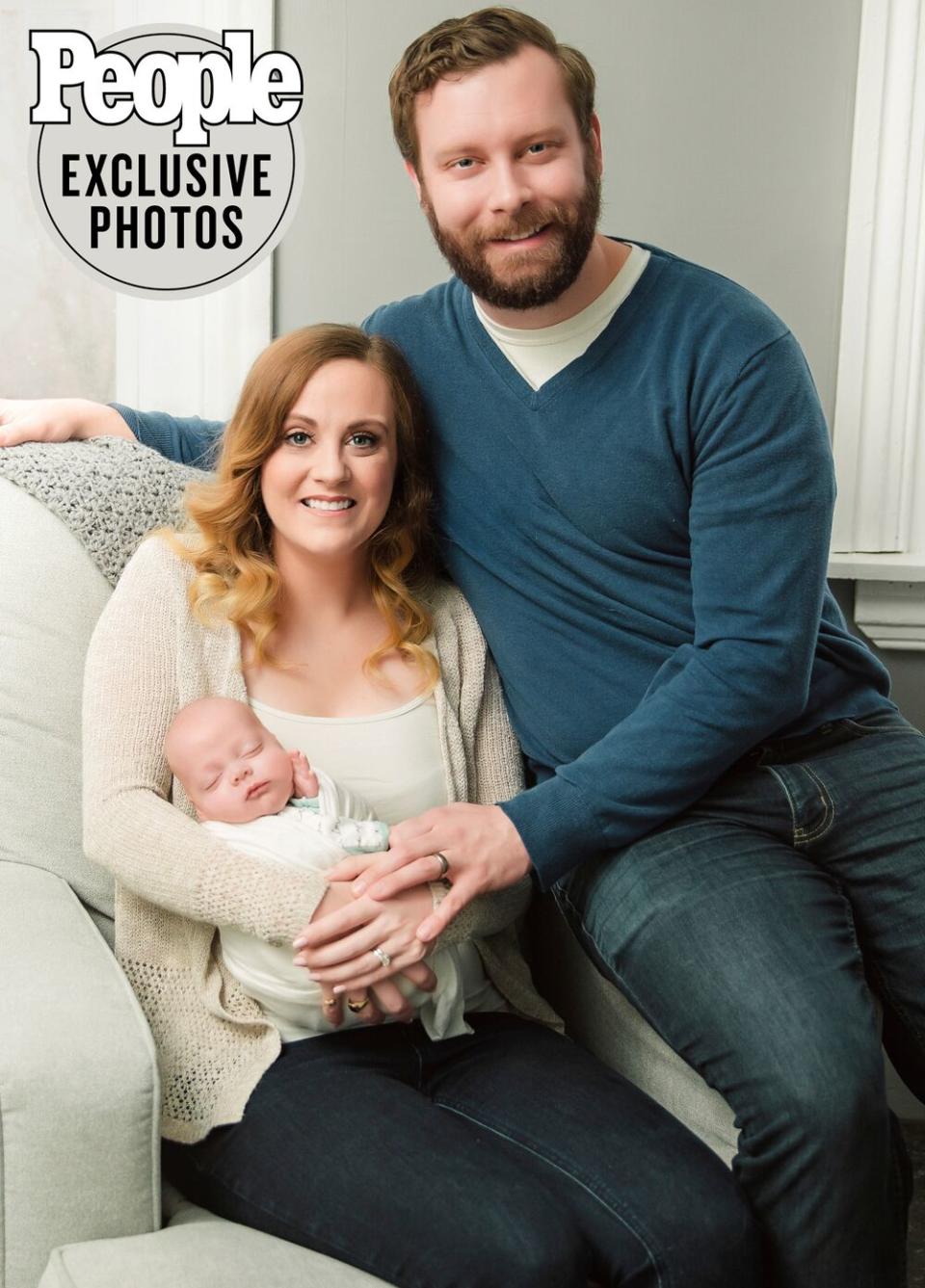Woman Who Gave Birth Via Uterus Transplant Says ‘It Was a Crazy Journey to Parenthood’
Before heading into work one morning last November, Jennifer Gobrecht stopped at her OB/GYN’s office at the Hospital of the University of Pennsylvania in Philadelphia. The 33-year-old event planner was about eight months pregnant, and it was just a routine check-up.
Her husband, Drew Gobrecht, had been at the office for about an hour when she called and told him to come to the hospital. Her blood pressure was high, and due to risk of pre-eclampsia, doctors advised the couple that it was time to have the baby.
The next afternoon, Jennifer had a C-section and delivered a healthy baby boy named Benjamin Thomas Gobrecht.
Jennifer always wanted to be a mom, but she never thought she would be able to carry a baby — in high school she was diagnosed with a rare condition called Mayer–Rokitansky–Küster–Hauser syndrome (MRKH). “I was just born without a uterus,” Jennifer says.
She is one of eight women in the country to give birth after having a uterus transplant. She wants to share her story and help other women with uterine-factor infertility.
When Jennifer and Drew started dating in fall 2007 — when they were both juniors in college — she told him about her condition.
“I knew Jen and I would be parents one day. I didn’t know how,” Drew said. “We knew it might be hard, but I knew we’d find a way.”
The couple married in 2014, and in February 2016, they did IVF and created ten healthy embryos.
In December 2007, Jennifer read a post on a Facebook group for women with MRKH about a research trial at Penn that was looking for women to volunteer to have a uterus transplant.
“It seemed like they were looking for someone just like me,” Jennifer says. She told her husband she wanted to apply.
“It’s another path to parenthood,” she says.
When the couple met with Dr. Kathleen O’Neill, medical director of the Uterus Transplantation for Uterine Factor Infertility (UNTIL) Trial at Penn, she explained that the procedure came with a lot of risks — and there was no guarantee that it would work.
Leaving the meeting, Drew was on the fence about whether they should go forward.
“I said, ‘Is this what we want to sign up for? Is this how we want to start a family?” Drew remembers asking Jennifer.
His wife replied, “This is an opportunity for us not just to start a family — but to help other women that have the condition that I have.”
That’s what convinced Drew that he wanted to participate, he says.
“How do you pass up an opportunity to help other people? There’s all sorts of infertility out there. People suffer in silence,” he says. “It’s a lonely journey. To get bombarded with questions like, ‘When are you having kids?’ It’s an invasive question. How do you even talk about it? We want people to know that they are not alone, and let people know that there are options out there for them. This is something we want to be accessible for everybody.”

After months of testing and counseling, the couple was accepted into the trial in Fall 2018. Just two months later, Jennifer had a uterus transplant.
“We were cautiously optimistic,” Jennifer says. “Even if it didn’t work, we wanted to at least be able to help propel the science along.”
About six months after the transplant, Jennifer got pregnant on the first try.
“We cried. A lot,” Jennifer says.
In November, Jennifer delivered her baby boy via C-section and became the second woman in the U.S. to have a uterus transplant from a deceased donor — and the third in the world. The first uterus transplant was in Brazil in 2017, the second was at the Cleveland Clinic in June. Six other women have had babies born after living donor uterus transplants at the Baylor University Medical Center.

There are an estimated 500,000 women with uterine-factor infertility. This procedure could give women more options.
“The vast majority of people with MRKH are not going to have a uterus transplant,” Dr. O’Neill says. “But knowing it’s possible and understanding the option is beneficial to the entire community.”
Penn Medicine announced Jennifer’s successful delivery in January.
In less than 24 hours, 100 women volunteered to be recipients and about 25 women signed up to be living donors. Jennifer elected to have a hysterectomy and remove the uterus after her delivery. The anti-rejection drugs compromised her immune system, and she wanted to be healthy.
“I’d rather be healthy for one baby, than try to strain myself to try to do two pregnancies.”
Now baby Ben is happy and healthy at home sleeping, eating and growing.
“We had a crazy journey to parenthood,” says Jennifer. “We’re blessed with the most angelic little miracle. He is such a good baby. We are so lucky to have him.”
To learn more on about Jennifer Gobrecht’s Uterus Transplant, pick up this week’s issue of PEOPLE, on newsstands Friday

